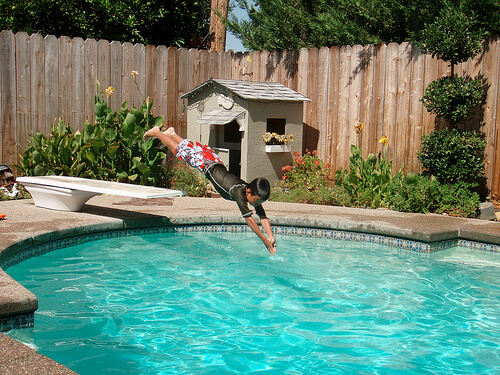-
26 March 2016
-
0 comments

Chlorine Pools VS Saltwater Pools
[TS-VCSC-Divider divider_type=”ts-divider-one”]Chlorine has been used for many years and it has done what is required. Maintaining a chlorine pool is a major task as it requires more maintenance that people think. You cannot just add a large chlorine tablet and expect the pool to remain clean. With any type of pool, a pool maintenance routine needs to be followed to ensure the pool looks its best. If you live in a warm area with hot temperatures, a pool that is neglected even just for a few days will turn green. Chlorine pools also require constant checking and balancing of the water. This is done by maintaining the pH and alkalinity levels. If these levels were to drop or rise it will make swimming an unpleasant activity because it will burn you eyes and hurt sensitive skin. The pool pH levels need to be kept as close to optimal level as possible and this can be a demanding task. Weather and rain or storms will easily affect the pH and alkalinity level which would require balancing after the storm as well as a dose of chlorine or a shock to stop algae from starting to grow.
Although chlorine is a widely used sanitizer there are people who are actually allergic to swimming in pools that have chlorine in them. Some people feel that chlorine irritates their skin and burns their eyes which will make swimming unpleasant.
Saltwater Pool Overview
Now for the salt pools – many people have tried salt sanitizer pools and never looked back. One of the main reasons for this is that there aren’t large amounts of chlorine in the water. One thing that people need to know is that salt water pools DO use chlorine to sanitize the water. Let me explain: Salt is a compound made up of chlorine and sodium. So when pool owners are adding salt to the pool, they are actually adding chlorine, but instead of being in its raw form – it is in the form of a compound. Every saltwater pool needs to have a salt water chlorinator, and the chlorinator uses electricity to produce chlorine by the method of electrolysis. The chlorine and sodium molecules are separated and then added to the pool water. This keeps the pool water clean and clear.
Salt water pools do require regular pH level checks and water tests, but the tests are not a strain on the pool owner like the chlorine tests are. Other maintenance tasks will still need to be performed, but with the power of the salt water these tasks should be easier and quicker to do.
Another major advantage to salt water pools is the financial benefits. Salt water pool owners save money in the long run because the price of salt compared to chlorine is a large difference. Converting from a chlorine pool to a salt water pool will involve spending some money, but the benefits are well worth it (see next paragraph). The money spent on converting your pool system will be returned in the form of savings on salt instead of purchasing chlorine and the lower maintenance.
I left this advantage for last because it really is a HUGE advantage compared to chlorine pools. Salt water pools can be magnificent to swim in due to the soft, gentle feel of the water. The water will also not cause any irritation to sensitive skin and for people who are allergic to chlorine water pool, saltwater pools are definitely the answer. Once you have swum in a salt water pool you will never want to swim in a chlorine pool again.
Between saltwater pools and chlorine pools, saltwater pools win hands down. The advantages are amazing and definitely worth the few extra bucks.
.
Share Social
